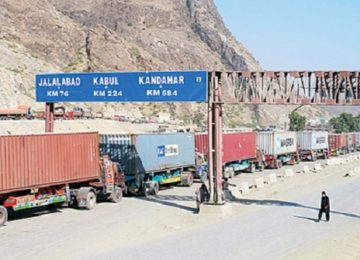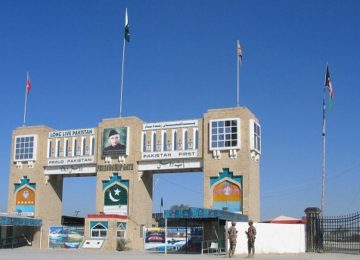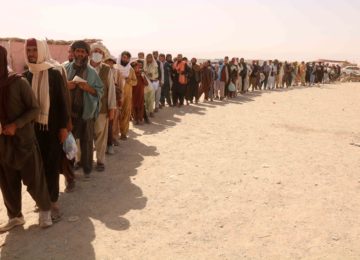January 15, 2018
An opinion piece published in Chinese daily Global Times argues that Pakistan had nothing to gain from joining the US coalition against terror in 2001, yet, sided with the US and making sacrifices down the road. However, these sacrifices are now being repaid inform of intimidation and enmity by the US.
The article further argues that Pakistan’s alliance with the United States and resulting “turmoil deterred foreign investors, triggered capital outflow and wasted development opportunities”. Furthermore, the author also argues that censuring Pakistan would not help the cause, and that the US should holistically cooperation with all important stakeholders in the Afghan conflict. The opinion piece in full can be found below:
—————————————————————————————————————————————-
US Repays Pakistani cooperation with enmity
By Long Xingchun and Li Tian
The US Department of State recently announced a suspension of security assistance to Pakistan unless it took decisive action against the Afghan Taliban and the Haqqani network. As early as August 2017, US President Donald Trump had accused Islamabad of giving “safe havens to agents of chaos, violence and terror.”
The US move has invited strong reaction from Islamabad.
Pakistan was a relatively safe and stable country before the US launched the Afghan war in 2001. Then Pakistani president Pervez Musharraf decided to join hands with the US in the war on terror under huge pressure and clamped down on the Pakistan-funded Afghan Taliban. It should be noted that neither the Taliban nor Al Qaeda hurt Pakistan’s interests, so overthrowing the Taliban regime was purely a move to cater to the US, for which Islamabad sacrificed a lot.
As many in Pakistan have sympathy with the Taliban, the fight against them has precipitated a severe social division. That was how the Pakistani Taliban, also known as Tehrik-i-Taliban Pakistan, came into being. Furthermore, the Afghan Taliban and terrorists crossed the Pakistan-Afghanistan border, plunging Pakistan in a decade-long turmoil. Pakistan witnessed frequent terror attacks on its land and US troops caused mass casualties among civilians, added to deaths of those directly involved and property losses.
The turmoil deterred foreign investors, triggered capital outflow and wasted development opportunities. It is estimated the war on terror has caused losses of hundreds of billions of dollars to Pakistan, a figure far beyond the US aid worth $33 billion.
In fact, the so-called US security aid to Pakistan is what the US should pay. The US military used Pakistani bases; the US air force occupied its airspace; the US ground transport vehicles passed over its territory, all of which damaged its infrastructure. The cancelled assistance, estimated at $250 million, cannot even cover the road tolls and the maintenance fees of the highways. In addition, the participation of Pakistani soldiers in the fighting has greatly reduced US casualties.
It’s not that Pakistan was not fully engaged in the war on terror, but terrorists are too obstinate. Over the past 16 years, the US organized hundreds of thousands of NATO troops, took out advanced, powerful weapons and spent trillions of dollars under the guise of combating terrorism. However, it still failed to root out terror and extremist groups in Afghanistan but instead pinned the blame on Pakistan.
The fence put up on the US-Mexico border with razor-sharp concertina wire cannot stop Mexicans from entering the US. In the same way, the 2,400-kilometer-long Pakistan-Afghanistan border along intertwined mountains and valleys can in no way stop civilians from crossing, let alone terrorists.
Therefore, adjusting its anti-terror strategy should be Washington’s foremost priority. The Afghan Taliban, in spite of its previous close relations with Osama bin Laden and Al Qaeda, should not be simply termed a terrorist group. It still has a group of followers in Afghanistan. So an anti-terror war aimed at eliminating the Taliban will never succeed. Washington had already recognized the need to talk with the Taliban and achieving reconciliation is the most effective way to ensure Afghan stability. However, negotiations have failed to make substantial progress over the years due to lack of trust between the US and the Taliban, and Washington’s inconsistent policy.
Therefore, the US needs to cooperate with Pakistan and other stakeholders in a holistic way. Censuring Pakistan is of no help in solving the issue.
The US war on terror will not necessarily succeed with Pakistan’s cooperation, but will definitely founder without it. That the White House froze security aid to Pakistan has fully exposed its arrogance and selfishness. Its image in the international community has been tarnished.
If Pakistan’s national interests and security cannot be ensured, the region will never see peace and stability. But if Trump’s real intention is to maintain US military presence in the region by keeping the turmoil alive, he will probably have his way with this new policy.
The author is a senior research fellow at the Charhar Institute and director of the Center for Indian Studies at China West Normal University. Li Tian is a research assistant at the Charhar Institute. opinion@globaltimes.com.cn
Disclaimer: Views expressed on this blog are not necessarily endorsed or supported by the Center for Research and Security Studies, Islamabad.








